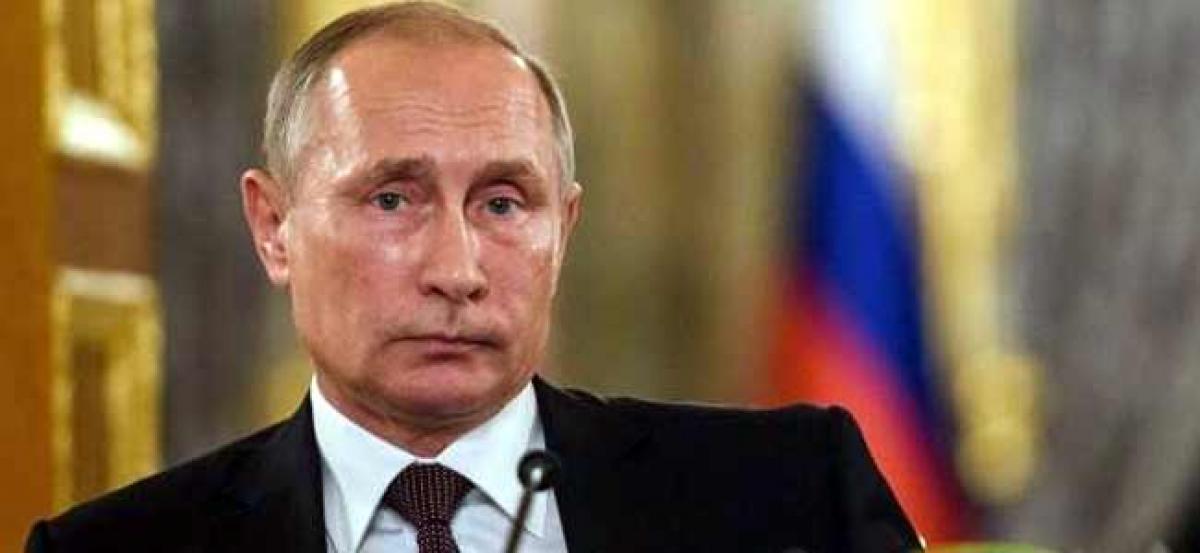Live
- G20 Leaders Will Talk About Climate, Taxes, and Trump's Return in Brazil
- COP29: CDRI announces $8 million funding for 12 projects to address climate crisis
- Anti-Telgu remarks: Actor Kasthuri Shankar moves court for bail
- Samsung AR Smart Glasses Set to Launch in 2025, Featuring Ray-Ban Meta-Like Design
- Kerala Industries Minister confident that new policy will boost plantation sector
- Madras HC plans inter-departmental monitoring committee to combat drug use in TN
- Bihar: Spotted deer dies due to heart attack in Banka district
- Mushtaq Ali T20: Shami to spearhead Bengal bowling attack, Gharami named captain
- Kharge's clarion call to oust Maharashtra's BJP-backed MahaYuti
- Why Ukraine’s Use of US Missiles Against Russia Could Lead to World War 3
Just In

Russia on Thursday cast its 10th veto of United Nations Security Council action on Syria since the war began in 2011, blocking a US-drafted resolution to renew an international inquiry into who is to blame for chemical weapons attacks in Syria.
Russia on Thursday cast its 10th veto of United Nations Security Council action on Syria since the war began in 2011, blocking a US-drafted resolution to renew an international inquiry into who is to blame for chemical weapons attacks in Syria.
The mandate for the joint inquiry by the UN and the Organization for the Prohibition of Chemical Weapons (OPCW), which found the Syrian government used the banned nerve agent sarin in an April 4 attack, expires on Friday.
A resolution needs nine votes in favor and no vetoes by the United States, France, Russia, Britain or China to be adopted. The US draft text received 11 votes in favor, while Russia and Bolivia voted against it and China and Egypt abstained.
The vote sparked a war of words between Russia and the United States in the council, just hours after White House spokeswoman Sarah Sanders said President Donald Trump believed he could work with Russian President Vladimir Putin on issues like Syria.
The April 4 sarin attack on Khan Sheikhoun that killed dozens of people prompted the United States to launch missiles on a Syrian air base. US Ambassador to the United Nations Nikki Haley warned after the council vote on Thursday: "We will do it again if we must."
Russian UN Ambassador Vassily Nebenzia said the US draft resolution was not balanced.
"We need a robust, professional mechanism that will help to prevent the proliferation of the threat of chemical terrorism in the region and you need a puppet-like structure to manipulate public opinion," Nebenzia said.
Russian bid fails
Syrian ally Russia withdrew its own rival draft resolution to renew the inquiry, known as the Joint Investigative Mechanism (JIM), after unsuccessfully pushing for its proposal to be considered second and not first, as council rules required.
However, following the vote on the US draft, Bolivia then requested a vote on the Russian text. It failed, receiving only four votes in favor, seven against and four abstentions.
Nebenzia said he was "deeply disappointed" and that those who voted against the Russian draft "bear the full brunt of responsibility for the cessation of operation of the JIM."
After the meeting ended Japan circulated a draft resolution to roll over the mandate for the inquiry for one month, diplomats said. It was not immediately clear when the council could vote.
Ahead of the council votes on Thursday, Trump urged the Security Council in a Twitter post to renew the inquiry, saying it was needed to prevent Assad from using chemical weapons.
While Russia agreed to the 2015 creation of the JIM, it has consistently questioned its findings, which also concluded that the Syrian government used chlorine as a weapon several times.
Russia has now vetoed 10 resolutions on Syria, including blocking an initial US bid on October 24 to renew the JIM, saying it wanted to wait for the release two days later of the inquiry's report that said the Syrian government used sarin.
"Russia has killed the Joint Investigative Mechanism," Haley said. "In effect Russia accepts the use of chemical weapons in Syria. How then can we trust Russia's support for supposed peace in Syria?"
Syria agreed to destroy its chemical weapons in 2013 under a deal brokered by Russia and the United States.
"We condemn the use of chemical weapons by anyone," Nebenzia said.

© 2024 Hyderabad Media House Limited/The Hans India. All rights reserved. Powered by hocalwire.com







